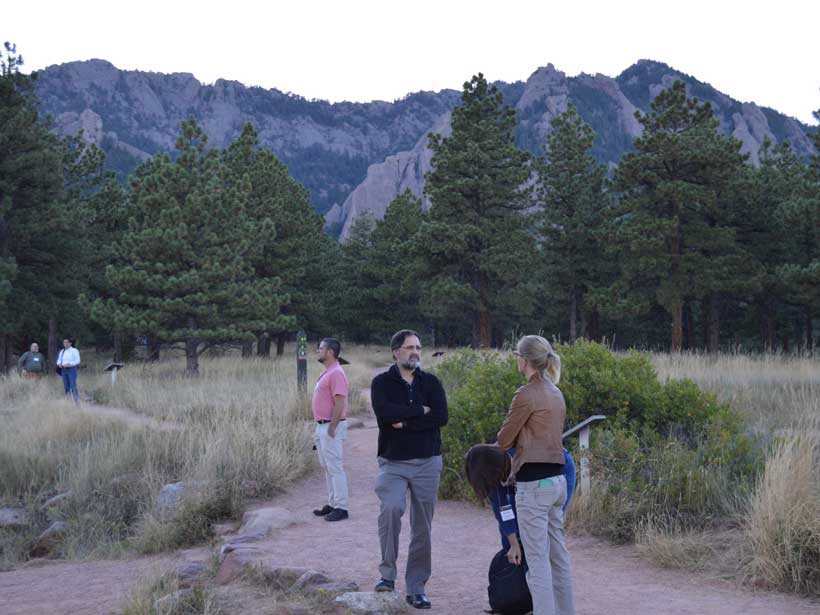Bigger gains in the retention and success of underrepresented minority students in STEM fields require strategic focus and a broader reach.
The geosciences continue to lag behind other science, technology, engineering, and mathematics (STEM) disciplines in the engagement, recruitment, and retention of traditionally underrepresented and underserved populations. Diversity is a vital priority for science because it promotes innovation, strengthens the community’s ability to tackle complex research problems, and creates public literacy and support. Although interventions aimed at broadening participation and promoting retention and success of underrepresented minority (URM) students in STEM fields in the past 3 decades have led to moderate increases in enrollment and degree attainment, bigger gains require strategic focus and a broader reach.
A recent charge of the National Science Foundation Directorate for Geosciences (NSF GEO) has been to develop “champions of diversity” in the geosciences who are committed to improving diversity in the geosciences. These champions focus on strategic leadership development and collaboration between geoscientists, social scientists, and broadening participation experts.
To promote diversity champions, NSF GEO launched the GEO Opportunities for Leadership in Diversity (GOLD) initiative. One of these GOLD-sponsored programs, called “Sparks for Change,” held a workshop in Boulder, Colo., in September 2017. The workshop was designed to support URM faculty and create mechanisms for faculty to effect change in their departments.
Sparks for Change believes that triads of diversity champions are best suited to change departmental culture in academia. The triads at the workshop included the following:
- sparks, early-career faculty who desire to reshape their department to value broadening participation
- partners, later-career department chairs or tenured professors in the same department who desire to collaborate in innovative change making
- sponsors, preeminent broadening participation experts outside of the institutional department
Small groups of committed people with clear goals can alter institutions with otherwise diffuse benefits.
Eight triads joined the principal investigator (PI) team to engage in exercises designed to unlock the intrinsic leadership skills of the participants. The PI team included Rebecca Batchelor, University Corporation for Atmospheric Research; John Crockett, San Diego State University; Sennai Habtes, University of the Virgin Islands; Brenee King, Kansas State University; and Robert Kirsch, Arizona State University.
The workshop relied on a theory of change in which small groups of committed people with clear goals can alter institutions with otherwise diffuse benefits. Participants focused on specific institutional knowledge and how different leadership behaviors could change those institutions. Sparks were trained in adaptive leadership, a dynamic process of mutual influence used to impact their environment. Partners learned about transformative leadership, through which leaders inspire others to achieve unexpected or remarkable results. Sponsors engaged in a novel leadership framework called solidarity leadership, developed by Robert Kirsch. Solidarity leaders diminish isolation in group work, energize collaborators, intervene for the greater good where necessary, and unify disparate interests and individuals through their perspective and experience.

The triad teams developed department-specific action plans in the form of logic models, which were presented, critiqued, and improved upon through whole-group discussion.
Sparks for Change will continue to monitor the implementation of the action plans with assistance from the Kansas State University Office of Educational Innovation and Evaluation. Overseers will track the formative and summative evaluations of departmental climates throughout the course of the program. Participants are planning additional publications on the effectiveness of small-group theory in stimulating departmental change.
Please visit the Sparks for Change website for more information about the workshop and participants.
—Robert Kirsch (email: [email protected]), Leadership and Interdisciplinary Studies, Arizona State University, Tempe
Citation:
Kirsch, R. (2018), Focusing on leadership to improve diversity in the geosciences, Eos, 99, https://doi.org/10.1029/2018EO097357. Published on 27 April 2018.
Text © 2018. The authors. CC BY-NC-ND 3.0
Except where otherwise noted, images are subject to copyright. Any reuse without express permission from the copyright owner is prohibited.

